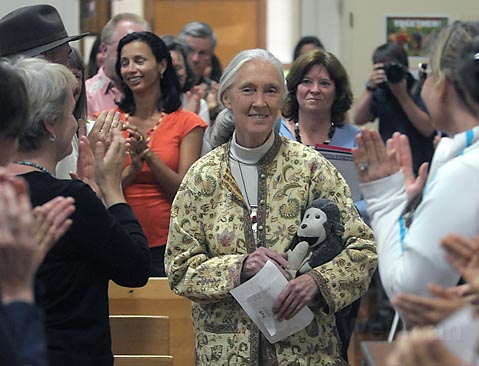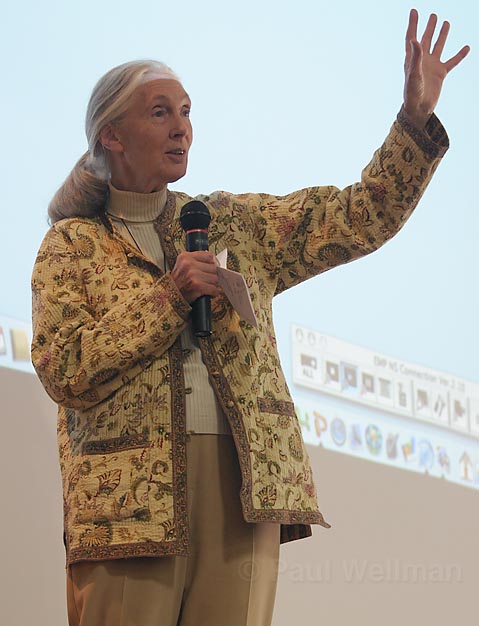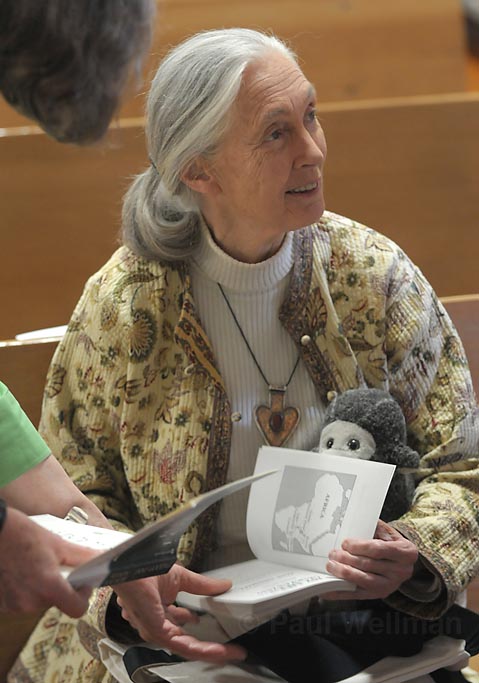Jane Goodall Visits Montecito Union School
Famed Primatologist Addresses Youth Volunteers

Growing up in war-torn England during World War II, Jane Goodall dreamed of a life spent in nature. Falling in love with Edgar Rice Burroughs’ Tarzan of the Apes, she imagined a day when she could live in Africa and work with animals. The only problem was that her family did not have enough money to send her to university. Being a girl made her aspirations difficult too, but her mother encouraged her to pursue her dreams despite the adversity she faced. “The best part about growing up was my wonderful mother,” she told students and parents in Montecito Union School’s auditorium yesterday afternoon. “She told me, ‘Jane, if you really want something and you put your mind to it and you work hard, you’ll get what you want.'”

Eventually Goodall found herself in Tanzania, Africa, and by a chance encounter with Lewis Leake, a well-known primatologist, was able to realize her dreams. Having waited on tables for a while to make ends meet, she was offered a job with Leake in 1960, beginning a career in primatology that has spanned a lifetime. “What the chimps have taught me is that there isn’t a sharp line dividing us from the rest of the animals,” she said. “We’re not the only beings on this planet with personalities, rational thoughts, and emotions.” Fascinated by the similarities in social behavior between chimpanzees and humans, she entered a field of study that was considered silly at a time when animal subjects were given numbers instead of names.
As time went by Goodall realized that the industrialized West was making its mark upon the African wild lands, and it wasn’t necessarily a good thing. “We have a very unsustainable way of living,” she said, “and we’re taking more away from the natural world than we need.” She told of a time when tribal hunters saw chimpanzees as fellow human spirits, and only took what they needed for sustenance. With the entrance of a Western-style economy however, these animals, and many others, became a commodity. Using logging trucks for transportation and modern rifles to hunt, hunters were able to kill more than they needed and sell the meat in villages for a higher price than was ever possible before. All of this came at a cost, though. According to Goodall’s analysis, there were over one million chimpanzees in Tanzania in 1960 when she started studying them. Today, there are only 150,000 left.
Roots & Shoots, the program sponsoring her visit, is a project of the Jane Goodall Institute dedicated to involving young people in environmental, humanitarian, and animal conservation projects. She decided to call the program Roots & Shoots in order to draw a comparison between an acorn and a youth-the acorn has all of the energy and potential locked inside to become a magnificent oak tree. “Every day that you live in the world, you make a difference,” she told the students, teachers, and parents in attendance at the lecture yesterday afternoon. “Our lives have a meaning, everyone has a purpose. We can choose to do good things or bad things, but we make a difference.”

Some area Roots & Shoots groups presented the projects they are involved in, which ranged from fundraising for polar bear conservation to helping the elderly to organizing beach cleanups. A student group from Santa Barbara High School called Net Cafe is focusing their efforts on a program called EcoCell-which recycles old cellular telephones. A group of students from UCSB is involved in Roots & Shoots as well, with each student engaging in a 30 hour service learning project.
Despite mounting global problems including climate change and loss of animal habitat, Goodall expressed hope for the future. “One of my real reasons for hope is the indomitable human spirit,” she said. Referencing a story where a man jumped into a chimpanzee cage in a North American zoo-risking his life to save a drowning chimp-she said that compassion is required. “There was a look in that chimp’s eyes that said, ‘Won’t anybody help me?’ If you see that look and you feel it in your heart, then you know what Roots & Shoots is about.”



